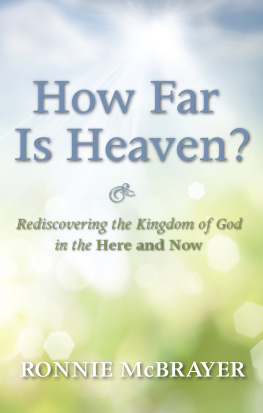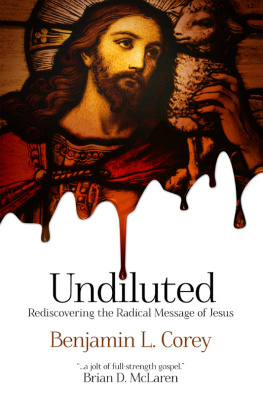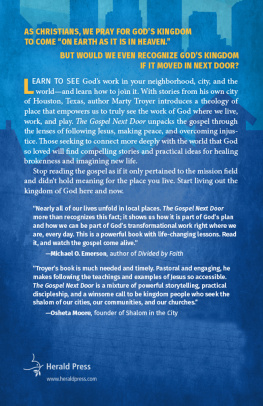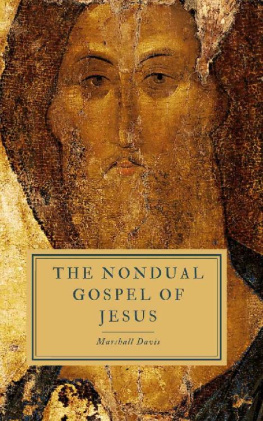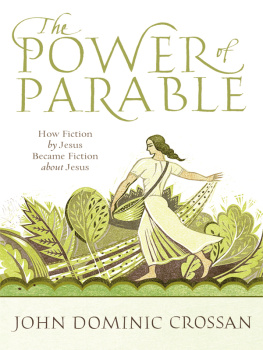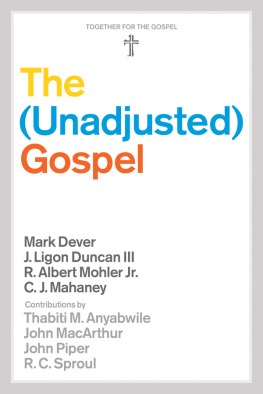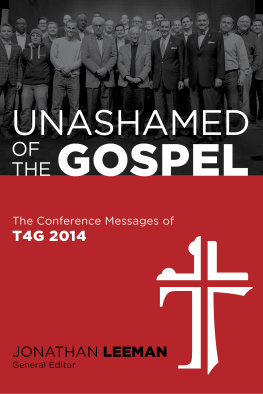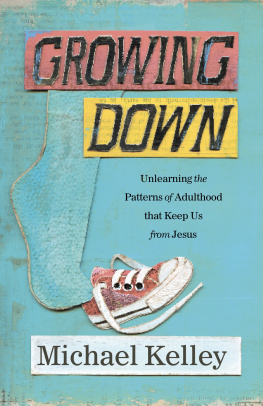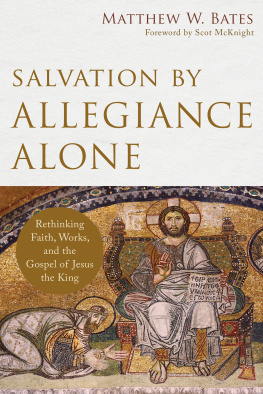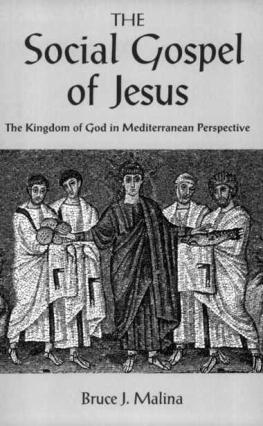Chapter 2
Do No Harm
The Kingdom of Heaven is like a farmer who planted good seed in his field. But that night as the workers slept, his enemy came and planted weeds among the wheat, then slipped away. When the crop began to grow and produce grain, the weeds also grew. The farmers workers went to him and said, Sir, the field where you planted that good seed is full of weeds! Where did they come from? An enemy has done this! the farmer exclaimed. Should we pull out the weeds? they asked. No, he replied, youll uproot the wheat if you do. Let both grow together until the harvest. Then I will tell the harvesters to sort out the weeds, tie them into bundles, and burn them, and to put the wheat in the barn.
Matthew : (NLT)
I cant say exactly how it happened but it did. I accepted a friends mysterious invitation to attend what he said would be the greatest Halloween celebration I would ever experience. He wouldnt share much more than that. So we met for dinner and then traveled deep into the spooky Appalachian hills to where a little Baptist church was hosting, much to my chagrin, a Hell House. For the uninitiatedand oh, how fortunate you are!a Hell House, also known as a Judgment House, is a revivalistic adaptation of a Haunted House.
At each Hell House the script is pretty much the same. A small group of attendees is led through the designated area, and there they become witnesses to scenes of violence or tragedy, scenes typically acted out by high school or college students from the local church. These scenes may involve a group of drunken teenagers killed in a car accident, a frat house drug overdose, or a horrid suicide. In that Hell House I was snookered into years ago, the main script revolved around a school shooting complete with copious amounts of fake blood, cracking firearms, screams of panic in the night, and a horde of the dead and dying. The manifestations are many, but the message is always the same: somebody is going to die and go straight to hell.
The attendees, watching behind the rope line, then observe as the dearly departed take their ill-prepared stand before the judgment seat of God. Their souls hang in the balance for only a few seconds (other participants are waiting to see the show), and then they are dragged away by howling, soul-thirsty demons to burn in eternal fire. After all this shock and awe, and with half of the attendees reduced to tears, it creates just the right moment for the Hell House organizers to present a gospel tract or brochure from the church, to give a well-timed altar call to repentance, or to conduct some plain old-fashioned fear mongering.
My friend thought I would benefit from seeing such a thing, hoping that I would lead my own congregation in hosting a Hell House the next Halloween. He was wrong. Im not a fan of those things, and as soon as the school shooting scenario began to play itself out, I headed to the car.
I know this type of generated fear very well. I grew up with it. No, we never had a Hell House at my churchthat would have been far too worldly or not found in the King James Version of the Biblebut hell was a favorite topic of the preachers that stood behind the pulpit each Sunday (and Sunday evening, at Wednesday night prayer meeting, at Vacation Bible School, and revival service in between). I had memorized a portion of Jonathan Edwards knee-rattling oratory classic, Sinners in the Hands of an Angry God, well before I was twelve years old, having heard it quoted so often, and I can still hear it ring through the church sanctuary: God holds you over the pit of hell, much as one holds a loathsome insect over the fire.... There is no other reason to be given, why you have not dropped into hell since you arose this morning. O sinner! Consider the fearful danger you are in: You hang by a slender thread.
None of this preaching comforted or encouraged me. It did not make me a better Christian. It did not make me long for heaven (who wanted to be with such an irritated God, anyway). No, it made me half-crazy, more in need of hospitalization and an injection of Thorazine than I needed another admonition to escape the fires of hell prepared for the devil and his angels, where the fire is not quenched, the worm dieth not, and the smoke of that pit rises up forever and ever (I still remember the oft-invoked warnings).
Hell was real, hell was hot, hell was forever, and I was in danger of going there right quick and in a hurry. The only way to avoid this horrible fate was to accept Jesus as my personal Lord and Savior. I did so with gusto, or as Bill Leonard described some conversions: We were saved hard, sweating like we had been to hell that morning and come back to the revival to tell about it that night. That was me; and the best I could tell, the only reason for Jesus and the entire church operationthe whole meaning of the Christian lifewas to evade hell and a very angry God who wanted people to go there pronto.
A favorite text of the fire-and-brimstone preachers of my childhood was this second kingdom parable of Jesus, a parable commonly referred to as The Parable of the Wheat and the Tares. Why was it so beloved? Well, it is so apparently black and white. Some are in, some are out. There is sure joy and definite punishment. Some will make it through heavens gates, but most will be sent to the fire. This parable was (and remains) a phenomenal revivalistic tool, giving full-throated endorsement to the accept-Jesus-to-escape-hell gospel.
Yet, I dont think that Jesus told this parable to prove that there is nothing between you and hell but the air. This is not a story that Jesus provided evangelists so that they would have means and motive to manipulate people down the aisle to the mourners bench. Rather, this is a parable about living a fruitful life now . At the risk of oversimplification, this parable is about our role in the world today; it is about blooming and growing where we are planted, bearing the fruit of the kingdom of God. Yes, the gospel is a gospel of urgency, but the urgent need is to respond to Christs call to bear much fruit in the world, a world desperate for healing.
To the parable at hand, Jesus confirms that there are two kinds of plants growing in the soil that is this world. First, there are the good plants sprung from good seed, the children of the kingdom of God. They will one day be harvested and brought into the Masters barn. Second, there are the bad plants sprung from bad seed, sown by the devil himself. These will one day be harvested as well, but these wiry, thistly thorns will be cast on the trash heap. I use that termtrash heapintentionally, as it seems to communicate most clearly Jesus idea (see Matthew :).
The most often translated word for hell in the New Testament is the word gehenna . Though used in the New Testament, it is a Hebrew word referring to a specific place, here in this world, not necessarily the world to come. Gehenna was and is the deep, narrow Valley of Ge Hinnom south of Jerusalem. There, the Palestinian ancients worshiped their fire gods and the idolatrous Jews of the past sacrificed their children to the pagan god Molech. Because of its distasteful past, this place eventually became a landfill, the city dump, where the trash and refuse of Jerusalem was cast. In Jesus day the bodies of criminals, rejects, and the poor who were without proper burial sites were cast there to rot in the open air. For generations on end, gehenna represented everything filthy, rejected, and under judgment.
We are hard-pressed then, to make hell (read gehenna ) as we have so often accepted it, to be anything different than the city of Jerusalems landfilla trash heapfor that is how Jesus used the word. In fact, of the dozen times the word gehenna is used in the New Testament, it is Jesus who uses that word exclusively, save one.
So while we could debate and deliberate on gehenna (many do) and the nature of hell (many more do that), that is not Jesus purpose here. He didnt elaborate about it (remember, Jesus rarely explains; nor will I). Again, we are looking for those key characteristics of the kingdom of God, and Jesus insisted that the ultimate outcome of these two very different seeds is not the more important issue of the parable. Rather, the key to interpreting this story is in verses . The workers ask, Should we pull out the weeds? And the answer is given: No, youll uproot the wheat if you do. Let both grow together until the harvest.
Next page
